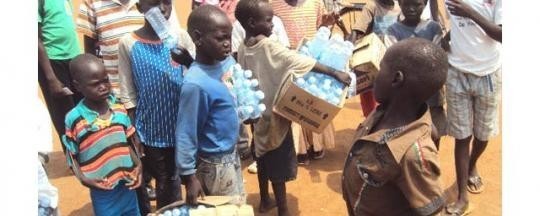Poor living conditions occasioned by economic hardships have triggered an increase in child labor in South Sudan’s Northern Baher el Ghazal state despite laws that protect children’s rights.
Several children interviewed by Radio Tamazuj said they decided to work hard to produce food and get money for their family’s daily needs.
The underage children have resorted to making bricks, burning charcoal, riding chariots, being porters, and selling fuel among other jobs in Aweil town.
Deng Mayen, a 13-year-old boy, said he had no option but to make bricks for which he is paid to provide food for his family. He said his parents are jobless and he dropped out of school.
“I am thirteen years old. My family does not have food so I come to work and take money home so that people can eat. I have been working here for fifteen days. I don’t go to school. My mother and father do not have jobs,” Mayen said.
Some of the children said they are school-going but their schools are closed, referring to the government directive to contain the spread of COVID-19 in the country. They said they work to generate money because no one helps them.
“The reason I come to make bricks is to search for my money. I stay without money if don’t work. We are pupils and our school in Yienth-Aluk was closed and I have started working here ten days ago,” 11-year-old Makuc Bol said.
Anguei Lual, a 14-year-old boy, said he has been riding a donkey chariot since he was ten. He says he prefers to generate income for himself and does not want to steal people’s properties like street children.
“We don’t want to steal somebody’s property and we are riding donkeys for money. We need our power. I have been working in the chariot since I was little about 10 years old. I have been working for a very long time and I don’t want to take away another person’s thing that is why I ride my donkey. This is my maternal uncle’s donkey; I work here and take his money home and he gives me mine. There are street children who do not work; they take away somebody’s things,’’ Lual said.
Another 13-year-old boy, Akol Akol, said he is a Primary Six pupil but has been selling fuel for two years.
“I sell petrol, it is my work. I sell fuel in bottles and jerrycans and I close at 7 pm. I have worked alone for two years,” Akol said.
Chol Dut, a 13-year-old child, said since his father passed on five years ago, he has been working at a brick site to help his mother in providing sufficient food for the family.
He said, “I am living in Maper here, I am thirteen years old and I don’t have money. My father died five years ago. My mother searches and brings the food so that we can eat.’’
People who employ the children have justified it saying they needed the money to survive while others say it is an opportunity to keep the children busy so that they don’t steal and get into unruly behavior.
Tong Lual Yor, who employs several small children, said the children come to him with different hardships and he is compelled to help them. In his defense, he claims he assigns them light work and pays them according to the tasks completed.
“We have just started making the bricks these days after the rainy season,” Yor said. “If a child comes to me and says they want to work, I give them work. Some don’t come back the next day but many children are looking for work.”
Yor says it is impossible to see children suffering and not offer them some job opportunities to meet their daily needs.
James Garang, who also employs children on his chariots, says the reason for assigning the small children to carry heavy loads is to keep them busy and protect them from unwanted activities.
“The reason why I assign them is to protect them from idleness and to prevent them from engaging in bad activities. Of course, they were at school in the past and when this problem of coronavirus appeared, they became idle,” Garang said.
Civil society groups have strongly condemned hard labor by children, describing it as 'exploitation of children' and called for an immediate stop to child labor.
Abraham Wol Kon, the Executive Director for Child Care Foundation- South Sudan (CCDF-SS), said child labor is prohibited by the laws of the land.
He referred to the United Nations’ convention on the rights of children that called for the immediate elimination of any activities that may affect the physical and mental health of the children.
“I think this issue of exploiting children is rejected by law. In particular, the Child Act 2008 rejects all forms of exploitation, all forms of corporal punishment against children because a child is considered to be someone below the age of 18, from 1-17 is considered a child,’’ Kon stressed.
According to the South Sudan Transitional Constitution’s Chapter II, (Part II), (Article 17), (Sub Articles: 1-4), every child has the right and must be protected from things that may harm their physical health, education, and mental health.




